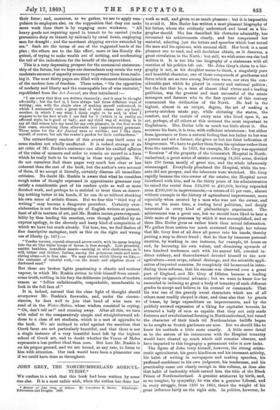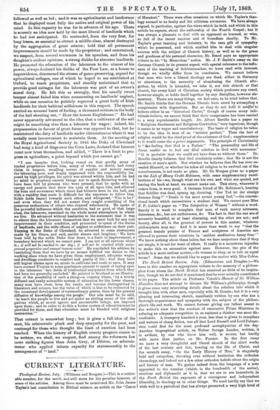JOHN GREY, THE NORTHUMBERLAND AGRICUL- TURIST.* WE confess to a
wish that this book bad been written by some one else. It is a most unfair wish, when the author has done her
• Memoir of John Grey, of Dilston. By Josephine E. Butler. Edinburgh: Edmonston and Douglas. 1869.
work so well, and given us so much pleasure ; but it is impossible to avoid it. Mrs. Butler has written a most pleasant biography of her father; whom she evidently understood and loved as a bio- grapher should. She has described his character admirably, has recounted his achievements clearly, and has compressed her material, selecting just the letters and speeches which best reveal the man and his opinions, with unusual skill. Her book is a most pleasant one to read, and will doubtless obtain, as it deserves, a great circulation in the North ; but still, we wish some one else had written it. It is too like the biography of a statesman with all mention of his politics left out. Mr. John Grey's claim to a bio- graphy is not, as his daughter seems to think, a singularly pure and beautiful character, one of those compounds of gentleness and force which are so rare among Northern races, nor even the con- siderable part which he played in county and national politics ; but the fact that he, a man of almost ideal virtue and a leading politician, was the greatest and most successful of the estate managers and farmers who in the first quarter of this century commenced the civilization of the North. He had in the highest, almost in an unique, degree, the art of making a poverty-stricken estate pay, while elevating the status, the comfort, and the morale of every man who lived upon it, an art, perhaps, of all others at this moment the most important to Englishmen. Mrs. Butler tells us much too little about it. She recounts his feats, it is true, with sufficient minuteness ; but either from ignorance or from a natural feeling that her father to her was a person and not a farmer, she gives us but too faint indication of hisprocesses. We have to gather them from his opinions rather than from the narrative. In 1833, for example, Mr. Grey was appointed " Receiver " of the property of the Greenwich Hospital in North- umberland, a great series of estates covering 34,365 acres, divided into 290 farms, mostly of great size, and the whole infamously mismanaged. Everybody plundered the Hospital, while the ten- ants did not prosper, and the labourers were wretched. Mr. Grey rapidly became the vice-owner of the estates, the Hospital never interfered with him, and in the thirty years of his administration he raised the rental from /25,000 to .£40,000, having expended some £100,000 in improvements,—a return of 15 per cent., almost without example in the history of agricultural improvement, more especially when secured by a man who was not the owner, and was, at the same time, a leading local politician, and deeply interested in every kind of philanthropic experiment. The achievement was a great one, but we should have liked to hear a little more of the processes by which it was accomplished, and on them Mrs. Butler gives us rather hints than actual information. We gather from notices too much scattered through her volume that Mr. Grey first of all drew all power into his hands, thereby putting a stop to direct fraud ; that he then by immense personal exertion, by working in one instance, for example, 48 hours on end, by becoming his own valuer, and dismissing upwards of two hundred tradesmen each with his annual bill, arrested in- direct robbery, and thenceforward devoted himself to the new agriculture—root crops, subsoil drainage, and the scientific appli- cation of imported manures. So completely did he succeed in intro- ducing these reforms, that his success was observed over a great part of England, and Mr. Grey of Dilston became a leading authority on agricultural advance ; but we want to know how he succeeded in inducing so great a body of tenantry of such different grades to accept and believe in his counsel or commands. That his was one of the gravely sweet characters which are of all others most readily obeyed is clear, and clear also that by grants of leases, by large expenditure on improvements, and by the publicly avowed expression of a liking for capitalist tenants, he attracted a body of men so capable that they not only made fortunes and revolutionized farming in Northumberland, but raised the character of their hinds till Northumbrian bailiffs began to be sought as Scotch gardeners are now. But we should like to know his methods a little more exactly. A little more detail as to the nature of his intercourse with the Hospital tenantry would have cleared up much which still remains obscure, and have imparted to this biography a permanent value it now lacks.
The figure of John Grey himself, however, the strong aristo- cratic agriculturist, his grave kindliness and his incessant activity, his habit of writing in newspapers and making speeches, his profound confidence in his own judgment, his tenderness, and his practicality come out clearly enough in this volume, as does also that habit of leadership which earned him the title of the Black Prince of Northumberland. A genuine aristocrat by birth, and, as we imagine, by sympathy, he was also a genuine Liberal, and in every struggle, from 1833 to 1863, threw the weight of his great influence fairly on the right side. In politics, however, he followed as well as led ; and it was as agriculturist and landowner that he displayed most fully the native and original power of his mind. In this capacity he was far in advance of his age. There is scarcely an idea now held by the most liberal of landlords which he had not anticipated. He contended, from the very first, for long leases, as essential to attract a middle-class, almost destroyed by the aggregation of great estates ; held that all permanent improvements should be made by the proprietor ; and entertained, we suspect, from several sentences in his speeches, and from his daughter's evident opinions, a strong dislike for absentee landlords. He promoted the education of the labourers to the utmost of his power, always declared his dislike of the Poor Law, as a bonus to improvidence, denounced the abuses of game-preserving, argued for agricultural colleges, one of which he hoped to see established at Oxford, to teach proprietors, and steadily maintained that to provide good cottages for the labourers was part of an owner's moral duty. He felt this so strongly, that his usually sweet temper almost failed him when commenting on landlords' neglect, while on one occasion he publicly reproved a great body of Irish landlords for their habitual selfishness in this respect. The speech excited an unusual burst of feeling, a thousand cottiers in the body of the hall shouting out, "Hear the honest Englishman !" He had never apparently advanced to the idea that a cultivator of the soil might be something else than a labourer for wages ; indeed, his prepossession in favour of great farms was opposed to that, but he maintained the duty of landlords under circumstances where it was socially most inconvenient to maintain them. At the meeting of the Royal Agricultural Society in 1846 the Duke of Cleveland had sung a kind of dirge over the Corn Laws, declared that farmers must now trust themselves, and added, "There is a limit to pro- gress in agriculture, a point beyond which you cannot go."
"I can imagine that, looking round on that goodly array of landed proprietors before him, many of whom, no doubt, had every claim to respect, recalling scenes of squalor and misery among the labouring poor, and deeply impressed with the responsibility im- posed by high privileges, his spirit was stirred within him, and he had no mind to prophesy smooth things nor to speak flattering words. I have been told by persons who were present, that he spoke with an energy and passion that drew the eyes of all upon him, and silenced the hum and movement which there had hitherto been in the hall, and with a rapidity that made it difficult for the reporters to follow him. Noble lords leaned towards each other, and whispered, 'Who is he ?' and even when they did not assent they caught something of the generous enthusiasm of others who cheered vehemently. He spoke of the powerful influence which the condition, bad or good, of that large class, the labourers, exercised on the whole moral atmosphere in which we live. He advanced without hesitation to the statement that it was to others than the labourers themselves that we must look for any real improvement in their condition, and proceeded to speak of the duties of landlords, and -the wide effects of neglect or selfishness on their part. Turning to the Duke of Cleveland, he adverted to some statements made by his Grace, and said, amidst cheers and laughter, We have been told by the noble Duke that there is a limit to improvement, a boundary beyond which we cannot pass. I am not at all nervous about it ; it will not be reached in our day ; it will not be reached while unim- proved properties and annual tenures exist.' He concluded his address by reminding them that we have by no means fulfilled our duties to the working-class when we have given them employment, adequate wages, and dwellings conducive to comfort and purity of life ; that they have stall higher claims upon us, minds to cultivate and souls to save. It may have seemed lJtopian to some gentlemen present to speak of laying open to the labourers ' fair fields of intellectual enjoyment from which they had been too generally excluded.' He pointed to Scotland as an illustra- tion of the possibility of such a thing—a country where, by a widely diffused and easily accessible system of education for the lower classes, many men have risen from the ranks, and become distinguished in literature and science, but the value of which is less to be estimated by, the occasional development of extraordinary genius, than by the general diffusion of knowledge among the people.' Our aim must be, he said, to teach the people to live and act under an abiding sense of the obli- gations which, as moral agents and accountable beings, are imposed upon them ; and in order to do this a better system of education must be provided for them, and that education must be blended with religious instruction.'"
That extract is somewhat long ; but it gives a fall idea of the man, his aristocratic pluck and deep sympathy for the poor, and contempt for those who thought the limit of exertion had been reached. When the history of English county progress comes to be written, we shall, we suspect, find among the reformers few more striking figures than John Grey, of Dilston, an adminis- trator who applied inborn capacity for statesmanship to the management of "land."































 Previous page
Previous page